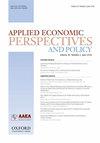普及免费校餐:研究影响采用社区资格规定的因素
IF 3.4
2区 经济学
Q2 AGRICULTURAL ECONOMICS & POLICY
引用次数: 0
摘要
由于认识到学校供餐是低收入家庭儿童的重要安全网,许多州正在通过立法,采用全民免费学校供餐,并将其资金与联邦政府资助的全民免费学校供餐计划 "社区资格规定"(CEP)挂钩。然而,在2018-2019学年,约有一半的合格学区没有参与CEP。本研究采用政策扩散方法和考克斯回归模型,证明了学区的认定学生比例(贫困水平)和州的直接认证率(认证学生获得免费餐)在增加采用 CEP 的可能性方面的重要性。本文章由计算机程序翻译,如有差异,请以英文原文为准。

Universal free school meals: Examining factors influencing adoption of the Community Eligibility Provision
Recognizing school meals as critical safety nets for children in low-income households, many states are passing legislation to adopt universal free school meals, linking their funding to the Community Eligibility Provision (CEP), a federally funded universal free school meal program. However, about half of all eligible school districts did not participate in CEP in the school year 2018–2019. Using a policy diffusion approach and a Cox regression model, this research demonstrates the importance of a school district's identified student percentage (poverty level) and a state's direct certification rate (certifying students for free meals) in increasing the likelihood of CEP adoption.
求助全文
通过发布文献求助,成功后即可免费获取论文全文。
去求助
来源期刊

Applied Economic Perspectives and Policy
AGRICULTURAL ECONOMICS & POLICY-
CiteScore
10.70
自引率
6.90%
发文量
117
审稿时长
>12 weeks
期刊介绍:
Applied Economic Perspectives and Policy provides a forum to address contemporary and emerging policy issues within an economic framework that informs the decision-making and policy-making community.
AEPP welcomes submissions related to the economics of public policy themes associated with agriculture; animal, plant, and human health; energy; environment; food and consumer behavior; international development; natural hazards; natural resources; population and migration; and regional and rural development.
 求助内容:
求助内容: 应助结果提醒方式:
应助结果提醒方式:


